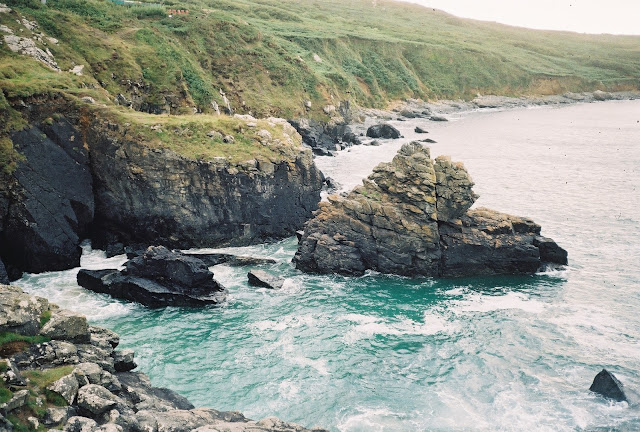"I will leave behind my terraces and my walls... They will be enough.
They will be more than enough." - Cruso in Foe by J.M. Coetzee.
It’s Narda.
It just won’t get better, the cancer has really charred a hole through his jaw.
Probably shouldn’t eat his meat. Good job I don’t have to milk him either.
Still, I let him continue grazing with the others on the slopes. Can’t see the
benefit in killing him. Maybe it’d leave more grass for the others, but not
very likely. I feel the rest of his warm, short coat for ticks and lumps before
sending him on his way for whoever I grasp out of the herd next. I often find
wounds from play and tease among themselves, or from when they’ve gotten too
far into the woods, among thorns and denser brush, or maybe something jagged
washes ashore. Ten. I always make sure there are just ten of them. I don’t need
any others.
There
wasn’t much more when old da was about. Back then counting the goats was his
job. He did it with rough hands and force; the goats would bleat and spring
away in confusion renewed daily. It was to feel the meat he said. To feel the
bones. There were even more goats when mother was there too, and even more back
when the old terraces and the old huts were just the huts and the terraces and
people skittered and roamed the Isle completing constant tasks in smiling
groups. The goats would skip and tumble about the terraces and be found in the
huts. They shrunk the woods with their trampling and munching and browsing.
It’s grown back now. It’s even spread.
The goats
have complete free roam of the terraces, no longer filled with rich dirt and
crops, but grass and stubble. Gale’s pregnant, so soon I’ll choose an old one
to bleed out. Still unsure if Narda’s flesh, hide and bones will be consumable
or usable. I don’t like putting out the goat’s sparky little lives, as I find
myself openly chattering away to them, treating them as my brothers and equals.
It’s not often I have to kill one, though. Just to keep the even ten. There’s
the fish of the sea and beach, the birds and their eggs which they lay in
crevices in the Northern cliff face, and the leaves and roots and berries and
mushrooms of the woods. A good crop to top it off, mainly hardy root vegetables
and perpetual greens. I collect the rainwater when it comes, and there’s the
stream that comes through the woods around the old huts. There’s a well, too,
but I don’t always trust it. Too old. Too underused. I’d go down and clear the
tunnel, but I don’t like the thought of the dark, small space. That was old
da’s job too.
I can still
talk mother’s language. On stormy nights when the wind and rain roar at the hut
an I can hear the sea blast the shore, I whisper some of the things she might
say to me, out in the air as it goes from humid to a crisp coolness in the eye
of the storm. After storms, the beach is filled with some small an large
treasures, and a decent stock of driftwood. I hear my mother’s language in the
lapping of the waves of the post-storm morning, a calm swash forever up the
bay.
Old da
tried to beat the language out of us. Re and throbbing, he’d scream that on the
Isle we talk the same tongue, we have to be part of the same group, we must all
be the same. The others would go silent and sad. I remember their voices
warbling old un-understandable songs out in the fishing boats coming back in to
the bay. Mother would sing her own tongue’s songs when working the terraces,
and everyone admired them. Slowly, after old da’s first explosion, the Isle
became emptier and emptier, until we had to slaughter more than half the goats
and burn their corpses before they rotted. The woods swallowed the huts, once
populous, and the terraces got riddle with weeds. Soon, the well started to
become untrustworthy. It was just old da, mother, me and the goats. The goats
knew nothing. Gleefully, they explored the territories opened up to them. I’ve
seen the stories and histories painted on the walls of the old huts. Their
colours and patterns once soothed me but now they make me sad, as they are
written in some other language that some of the other Islanders brought with
them. Somehow I felt their language and writing was much more ancient than I’ll
ever truly grasp.
The goats
congregate around old da’s grave, as it makes a sudden and unnatural change in
the otherwise naturally sloping topography. When he died, with just me and him
on the Isle, he smiled, weak and feverish, rook my hands, and whispered “It’s
all yours. I leave it all for you, my lad. The Isle is your inheritance.”
I do not count the seasons as I
should. I understand the changes that happen over a year, but no longer have
anyone to share the significance of time with. I wait for them. Mother told me
about them, the groups, and their many names; “coast guard,” “army,” “police,”
“government.” Strange, nonsensical names. They will come, and they will be
people, as I am people, and we will finally share the Isle, just like before.
Just as it should be.

No comments:
Post a Comment